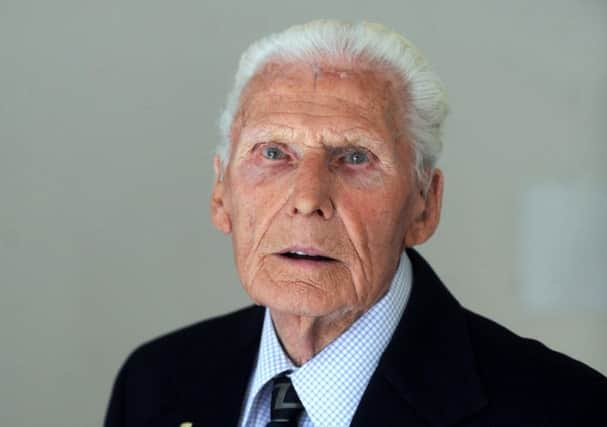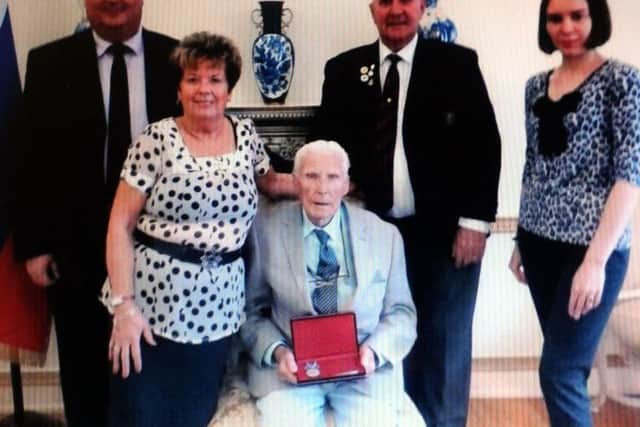70 years on, Leeds Arctic Convoy veteran Fred is honoured by Russians


Now, more than 70 years on, one of the seamen who braved horrifying conditions during the Arctic Convoys to Russia has been formally recognised by the country’s president.
Fred Jackson, 94, from Farsley, Leeds, was among those who took part in Allied efforts to deliver supplies to Russia after it was invaded by Germany in June 1941.
Advertisement
Hide AdAdvertisement
Hide AdThe dangerous route passed through a narrow funnel between the Arctic ice pack and German bases in Norway, meaning many of the convoys came under attack. Over four million tons of supplies were delivered to the Russians.


Three thousand men died during the campaign and faced conditions that were among the worst encountered by any Allied sailor, with extreme cold, gales and pack ice meaning the loss rate for ships was higher than any other convoy route.
Mr Jackson this month travelled down with his family to the Russian Embassy in London to be given the Ushakov Medal, named after Russia’s own naval hero, Admiral Ushakov and presented to sailors who have displayed courage in the course of defending Russia.
He is among the urviving veterans of the campaign to be contacted by the Russian government so they can be honoured with a medal for their bravery.
Advertisement
Hide AdAdvertisement
Hide AdHis son-in-law David Maggs, 71, a lorry driver from Morley, said: “He is proud to get the medal, he never expected it.
“We were introduced to the attache and other members of the Russian Embassy staff. She spoke about what was about to happen and then they read everything out. It was brilliantly presented.
“We were absolutely proud. What I care about is my father-in-law. He was responsible for going out on the convoys and you couldn’t believe what they had to put up with.
“On the Arctic Convoys it was 40 or 50 degrees below and they were chopping ice off the ships. On land you can cope with the cold, at sea it would have felt like it was 80 below.
Advertisement
Hide AdAdvertisement
Hide Ad“He spoke to me about it once, seven years ago, but never apart from that. Some of the men who went through this in World War Two didn’t want to speak about it at all.”
As well as serving on two Arctic Convoys to Russia, Mr Jackson was aboard the Royal Navy aircraft carrier HMS Glorious when it was sunk by German battleships in June 1940, in one of Britain’s most devastating defeats of the war.
More than 1,200 people died and only a few dozen survived. Mr Jackson’s family believe he may be the only survivor of the attack who is still alive today.
Between last July and this August, the Russian Embassy has held a series of Ushakov Medal awarding ceremonies in London and other parts of the UK.
Advertisement
Hide AdAdvertisement
Hide AdThe Foreign Office initially did not allow Russia to honour the veterans as it broke the rules on foreign medals being bestowed on British sailors.
It later allowed an “exception to the rules” and President Vladimir Putin presented the first medals during his visit to London in 2013.
In a speech during the medal presentation ceremonies, Russia’s British Ambassador Alexander Yakovenko said he presented the Ushakov medal “on the instructions of president Vladimir Putin”.
He said that it was a “huge privilege for me to thank you on behalf of the Russian government for the invaluable contribution you and your comrades-in-arms made to the defeat of Nazi Germany”.
Advertisement
Hide AdAdvertisement
Hide AdHe added: “What you did 70 years ago, taking part in what in Sir Winston Churchill rightly called the worst journey in the world, was extraordinary, even among what is considered to be beyond the call of duty.”